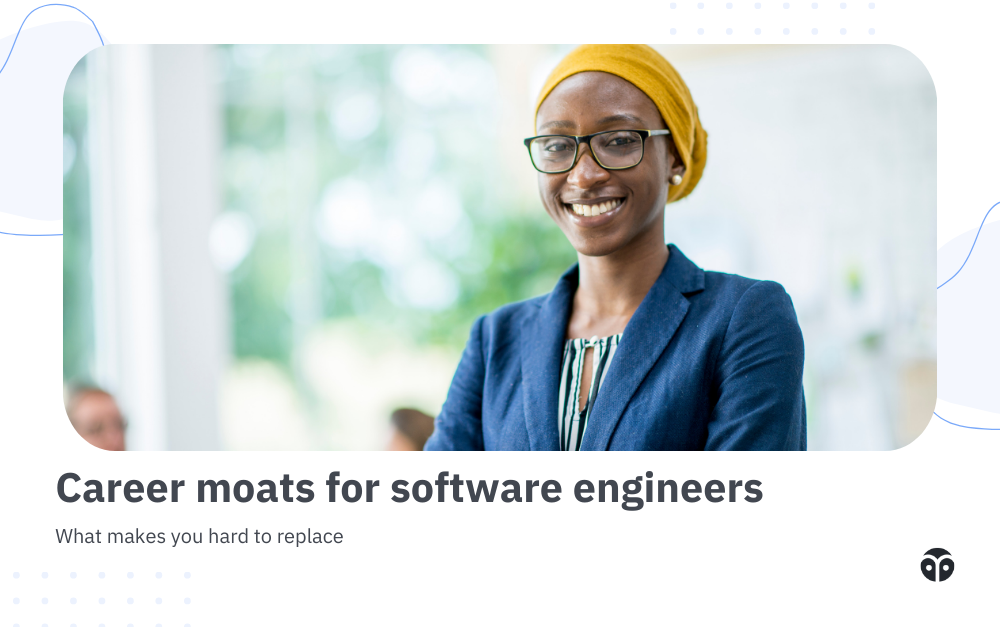Career moats for software engineers: what makes you hard to replace
Six career moats for software engineers that AI can't replace: context, product sense, judgment, communication, mentorship, and learning.

As AI handles more of the repetitive and mechanical parts of software engineering, it’s worth asking: What actually makes a software engineer valuable over time?
Speed and syntax familiarity aren’t moats anymore. What stands out now are the skills that are harder to automate, harder to teach, and harder to replace. These are the things that create long-term leverage for your career.
Here are six moats worth building.
1. Deep context
It’s one thing to write code that works. It’s another to understand why things are built the way they are, what’s been tried before, and how one seemingly small change could affect five teams downstream.
Engineers who carry deep system context across the codebase, the product, the org, and the people are incredibly valuable. They’re the ones who can spot edge cases before they break production, who know which tradeoffs were intentional, and who understand not just what to do, but what not to touch.
How to build it:
- Follow the thread when something breaks — ask why, not just what
- Pay attention to historical decisions and the reasoning behind them
- Build cross-team relationships to understand how work connects
2. Strong product sense
If you can write code but can’t reason about the user, you’ll build fast but miss the mark.
Product-minded engineers are hard to replace because they ask smart questions, challenge assumptions, and tie their work to real outcomes. They help teams build more intentionally, with fewer cycles wasted on rework or misalignment.
How to build it:
- Spend time with PMs and designers
- Push for clarity on goals and success metrics
- Ask: “How will we know if this feature is working?”
3. Good judgment under constraints
The best engineers aren’t always the fastest. They’re the ones who know when to ship a quick fix and when to invest in a durable solution. Who can name the tradeoffs clearly, align the team, and choose the right tool for the job, even if it’s not the fanciest.
This kind of judgment becomes more valuable when AI gives you more choices, more speed, and more surface area to work with.
How to build it:
- Clarify the constraints before jumping into code
- Watch how experienced engineers talk through tradeoffs
- Practice saying no when something isn’t worth the effort
4. Clear, proactive communication
You can have the best implementation in the world, but if no one knows why you built it, what it changed, or how to use it, you’re adding confusion, not value.
AI can help you write code. It can’t align your team.
Engineers who communicate clearly, who write thoughtful PRs, give context in Slack, and surface decisions early are the glue that holds teams together. And in remote or async environments, this becomes even more important.
How to build it:
- Make communication part of your process, not an afterthought
- Practice summarizing complex decisions in simple language
- Default to clarity, not cleverness
5. Mentorship and internal trust
Mentors, onboarding buddies, and go-to teammates are the ones who shape team culture, accelerate ramp-up, and build long-term trust. They hold institutional knowledge and create psychological safety, two things you can’t buy or automate.
How to build it:
- Offer to pair, especially with newer teammates
- Share your thinking out loud during code reviews or planning
- Pay attention to who’s struggling and offer support
6. A learning mindset
Tech is always evolving, but right now, that pace is accelerating. With AI, new frameworks, and changing team structures, what worked last year might not work next quarter.
The engineers who stay curious, open, and flexible will always find a way to stay relevant. It’s not necessary to be on top of every trend, but you have to be willing to explore, adapt, and figure things out as they change.
How to build it:
- Try things, even if they’re a little outside your comfort zone
- Follow engineers who think out loud and share what they learn
- Share your own experiments (even if they’re small)
Build the moat before you need it
No one becomes irreplaceable by knowing the most keyboard shortcuts or writing the cleanest code. Career moats are built from the things that compound: judgment, product sense, trust, and adaptability.
AI might be changing how we write code, but it’s not changing what makes a great engineer.
Get holistic interview prep with Formation
The Formation Fellowship gives mid-level and senior engineering job seekers everything they need to land their dream roles — including personalized skill brush-ups, resume help, unlimited mock interviews with experienced software engineers and hiring managers from top-tier tech companies, career and negotiation support, and more.
If you’re having trouble navigating your job search on your own, apply here and get unconditional support from a team of engineering mentors, technical recruiters, career coaches, and more.
